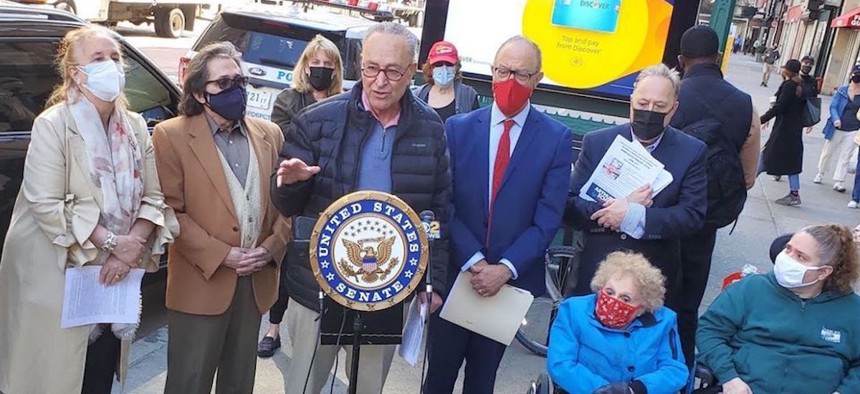Striving for equity for the disability community
Mike Schweinsburg, president of the 504 Democratic Club, talks about the organization’s plans for 2023 and developing relationships with politicians.

Attorney Arthur Schwartz holds a press conference with the 504 Democratic Club and Senate Majority Leader Chuck Schumer to announce elevators and elevator ramps will be installed and made accessible on subway stops along 14th St. in Manhattan after prior plans were stalled. 504 DEMOCRATIC CLUB
The 504 Democratic Club began 40 years ago and continues to push for equity for the disability community in New York City. Led by Mike Schweinsburg, the club works with officials and civil rights groups to increase awareness of the disability community and enact protective laws. The club is currently meeting with dozens of incumbents who are on the ballot to determine endorsements. Schweinsburg spoke with New York Nonprofit Media about educating officials on disability advocacy, the club’s stand against a potential merger of Mount Sinai and the New York Eye and Ear Infirmary, and the organization’s future.
This interview has been edited for length and clarity.
How was 2022 for the 504 Democratic Club and what strides did you make last year?
In Albany, in the first half of 2022, I was invited to speak at three different press conferences where we unveiled 20 new pieces of legislation. That's unprecedented. Before I took over, it was five, maybe six a year and we were happy with that. There are those that are just performers, such as adding signage but not things that are of great impact and easy for them to pass. We go to them with asks that are not so obvious. With enough lobbying, we bring enough assembly members and senators together to get it passed.
You've said that developing relationships with officials and educating them on disability advocacy is crucial for your community's future. What information and resources does the 504 Democratic Club provide to officials?
Our primary tool comes in the form of our questionnaire. As we are a citywide club, this is a very involved process. Last year we were looking at 104 races, meaning hundreds of candidates we were attempting to educate. This year all 51 Council districts are on the ballot. A relatively small number of incumbents are being challenged so it's a far less complicated process.
Through the questionnaire and the endorsement interviews that follow, we seek to inform all incumbents and their opponents of the issues that affect the disability community. In most cases opponents are themselves community leaders so win or lose we want them to at least have the disability perspective. Generally speaking we leave the topics from the questionnaire out of the discussion we have with candidates in the screening. That way, we are able to impart as much information as possible during the endorsement process. We follow up with meetings with incumbents after the elections and discuss items of interest when we encounter them at community events like all the inaugurations that took place so far this year, Town Halls and other cultural events.
What is particularly gratifying is that more recently elected officials have been reaching out to us and asking for information or other assistance, and we have been crafting legislation with certain elected officials.
I wanted to ask about Mount Sinai and The New York Eye and Ear Infirmary and the merger that was halted. What are your plans to stop this merge from continuing?
We're applying pressure to Albany and City Hall. City Hall doesn't have direct authority, but a unanimous resolution coming out of the City Council would have impact. And, you know, getting people motivated to get out there and demonstrate, rally. The bigger the rallies we can have, the more the press is going to carry them. We can bring press attention to the problem, or political attention to the problem. Just as we did with Beth Israel, we can save the New York Eye and Ear Institute, which is a 200 year organization that has been in the same location for 166 years, and was very profitable.
What are your organization’s goals and plans for 2023?
Most immediately, we seek to ensure we have a supermajority of the City Council as friends and allies in the fight for disability rights. Every Council member we have endorsed thus far has agreed to sign on to an elected officials letter going to the Commissioner of the Department of Health to ask him not to approve the merger of Beth Israel Hospital and the New York Eye and Ear Infirmary.
Through legislation we helped craft, we seek to end the affiliation between New York state and the Judge Rotenberg Center in Massachusetts, where we send an estimated $100 million per year. They are the very last facility in the United States to still utilize electroshock torture and in every case it is applied to people with disabilities. The legislation is called Andre's Law, named after a boy who was strapped to a table for 7 hours and repeatedly shocked until welts appeared all over his body and he fell into a catatonic state. His sin? Not taking off his coat!
We are also working to ensure that all open streets are truly accessible, including for Access-A-Ride and medical emergency vehicles.
And we seek to make restaurant sheds seasonal because in the event of a snowstorm, people with mobility devices cannot navigate sidewalks because of the patchwork shoveling and need to take bike lanes to go from one corner to the next. The problem with the sheds is they create obstructions as the city plows the street and piles snow onto the back of the sheds. It spills over into the bike lanes and streets.
